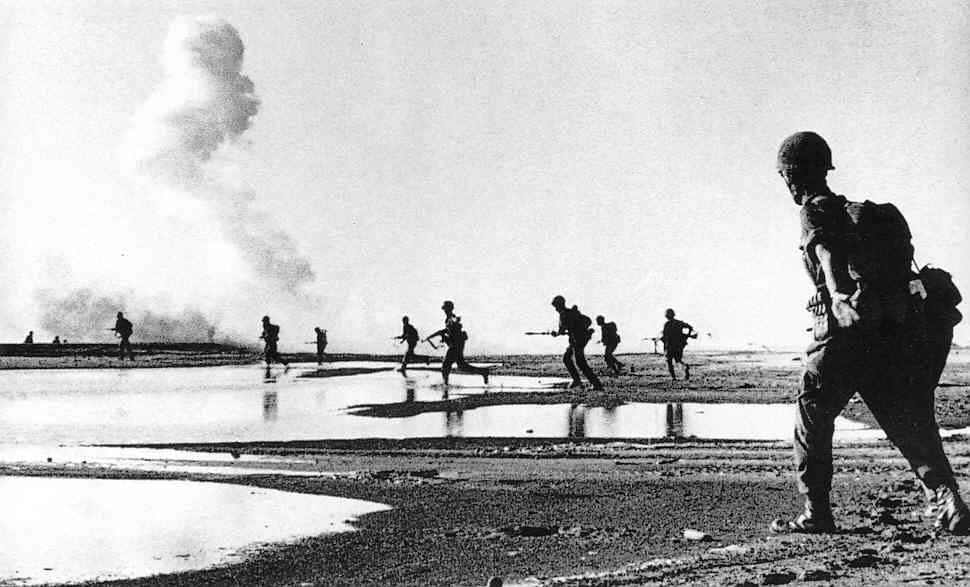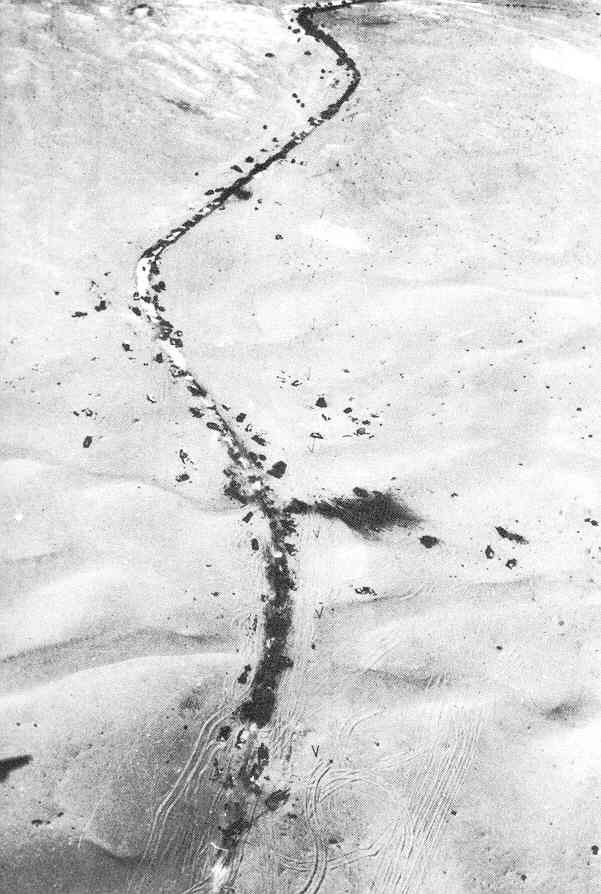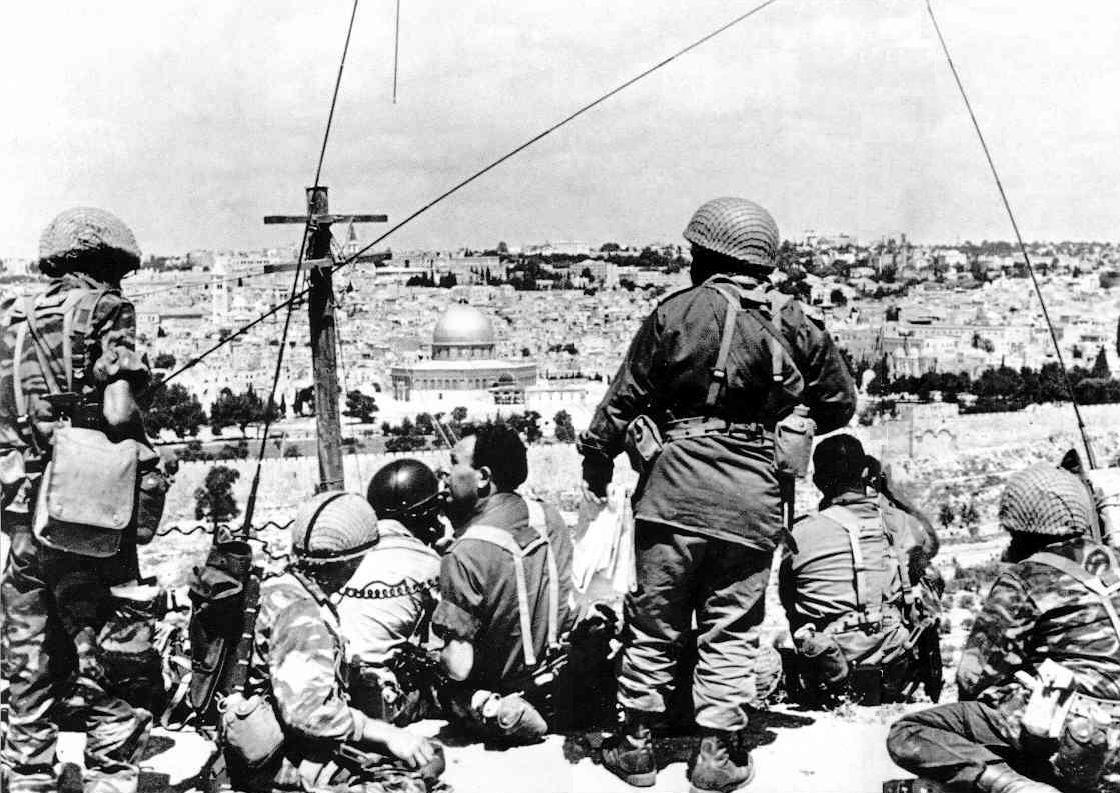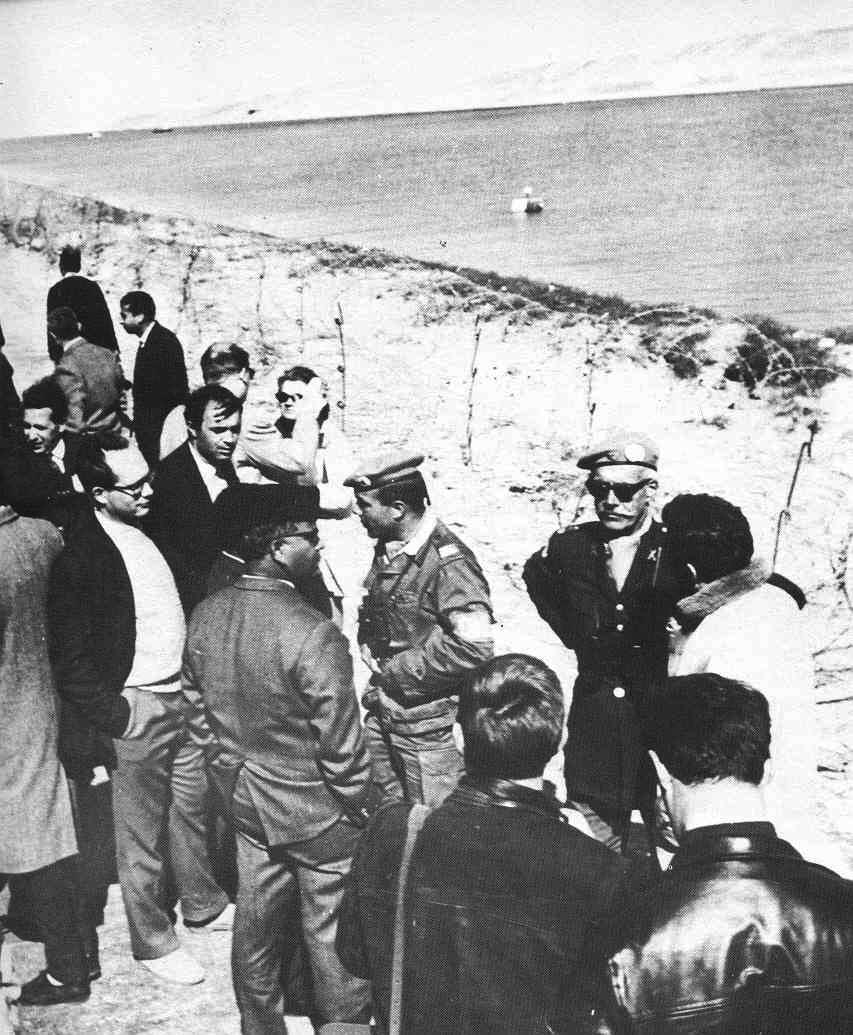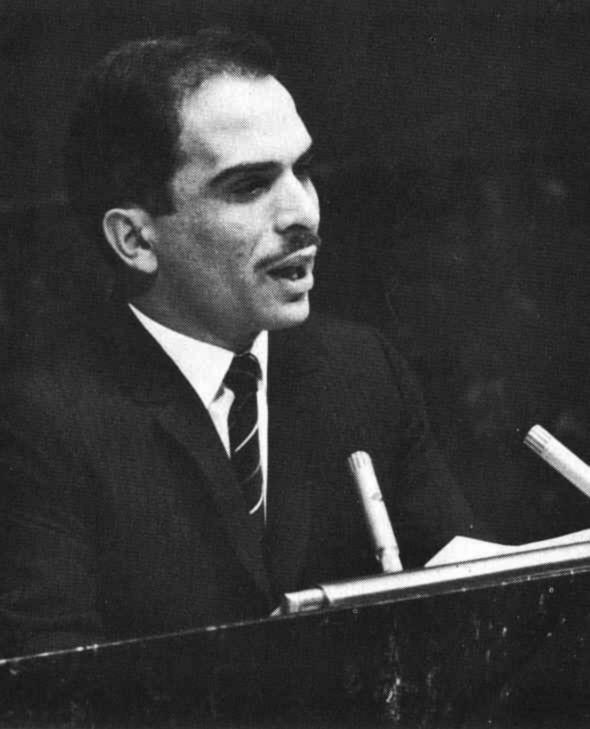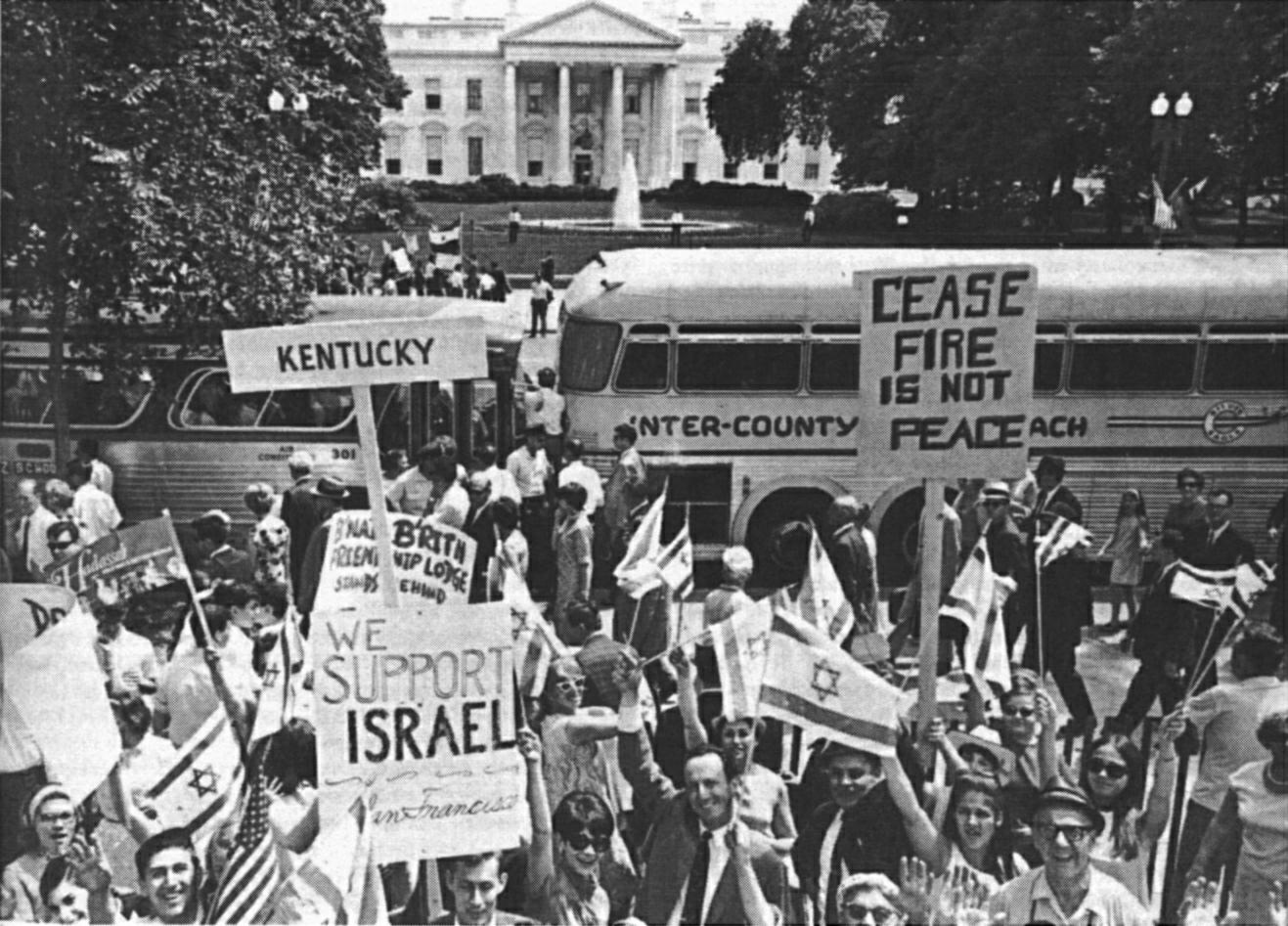19. THE SETTLING IN OF THE COLD WAR


THE ARAB-ISRAELI "6-DAY WAR"
June 1967
 Egypt gets loud in its anti-Israeli rhetoric
Egypt gets loud in its anti-Israeli rhetoric
 The Israelis strike the first blow
The Israelis strike the first blow
 The United Nations immediately
The United Nations immediately
attempts to intervene
 Jordan and Syria intervene ... and lose a
Jordan and Syria intervene ... and lose a
massive amount of territory
 An unexplained Israeli hit on an
An unexplained Israeli hit on an
American ship observing the event
 Israeli victory ... Arab defeat
Israeli victory ... Arab defeat
 The larger social-political results of the
The larger social-political results of the
Israeli victory
The textual material on page below is drawn directly from my work
A Moral History of Western Society © 2024, Volume Two, pages 309-310.
EGYPT GETS LOUD IN ITS ANTI-ISRAELI RHETORIC |
| In
general, Americans had been rather "neutral" in the matter of the
dispute going on between the Arab Palestinians and the European Jews
over the rights to the land of Palestine/Israel. Americans were
very understanding of the plight that the Jews found themselves in …
especially with the shocking liberation of the German death
camps. But the Palestinians were understood to have the same
rights to govern their own lands as any other people in the
world. Indeed, Palestine included a good number of Christians …
favorite tourist sites Bethlehem and Nazareth in fact being quite
Christian Arab. And the capital Jerusalem had long been quite
peacefully divided among Christians, Muslims, and Jews… each possessing
their own "quarter" of the city (Christians actually possessing two of
those quarters). So there was plenty of reasons for Americans to
be as sympathetic to the Arab Palestinians as they were to the Jews
flooding into Palestine. Of course it was, and had been since the beginning of the 20th century, this "flood" of European Jews into the land that had shattered that communal peace. And the UN's 1947 proposed division of Palestine into two separate countries had not brought any peace to the land. The Arabs were furious that U.N. "outsiders" had once again dictated their own Arab destinies. Then too, this Arab-Israeli dispute had served quite well the cause of Arab nationalism, giving the Arab world across the entire Middle East an issue to rally around … and would-be Arab leaders a cause that they could use to promote their own political careers. And the master of that strategy was Nasser, President of his new United Arab Republic (the UAR of Egypt plus Syria). Most loudly Nasser took the lead in building up the military capabilities of his UAR … the presumption being that he was thinking about simply "liberating" neighboring Palestine. But mostly his boasting was ignored by the outside world – especially by Johnson, who was fully occupied with the Vietnam mess. But finally U.N. Secretary General U Thant felt it was time to address the matter – and in late May of 1967 traveled to Egypt to see if he could get Nassar to back down a bit on his anti-Israel posture. But to Nasser, this posture was so essential in his claim to be the Arab world's leader that there was no way he would ever back down. |
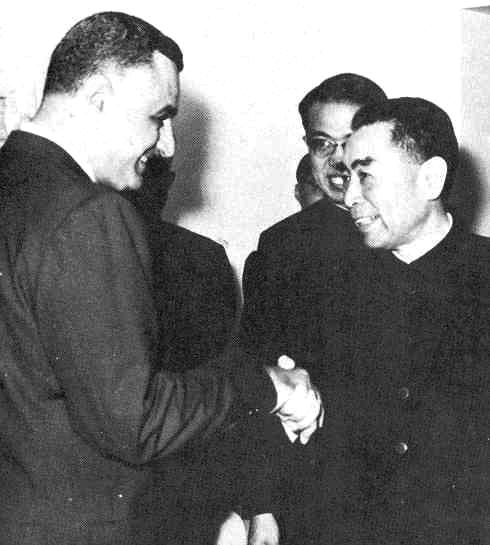
Arab leader Gamal Abdel Nasser
(Egyptian President)
meets with Communist Foreign Minister Chou En-lai
– 1963
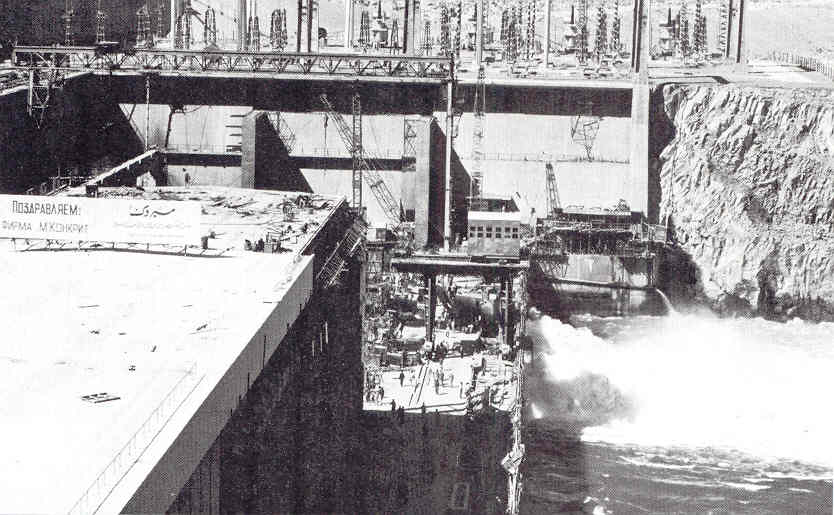
Building the Egyptian Aswan
High Dam (completed in 1971) – with Russian help
In the Middle East, things
are heating up again ... under the initiative of Egyptian President Nasser who is playing the 'Israeli
card' in order to swing a rising spirit of Arab nationalism under his authority
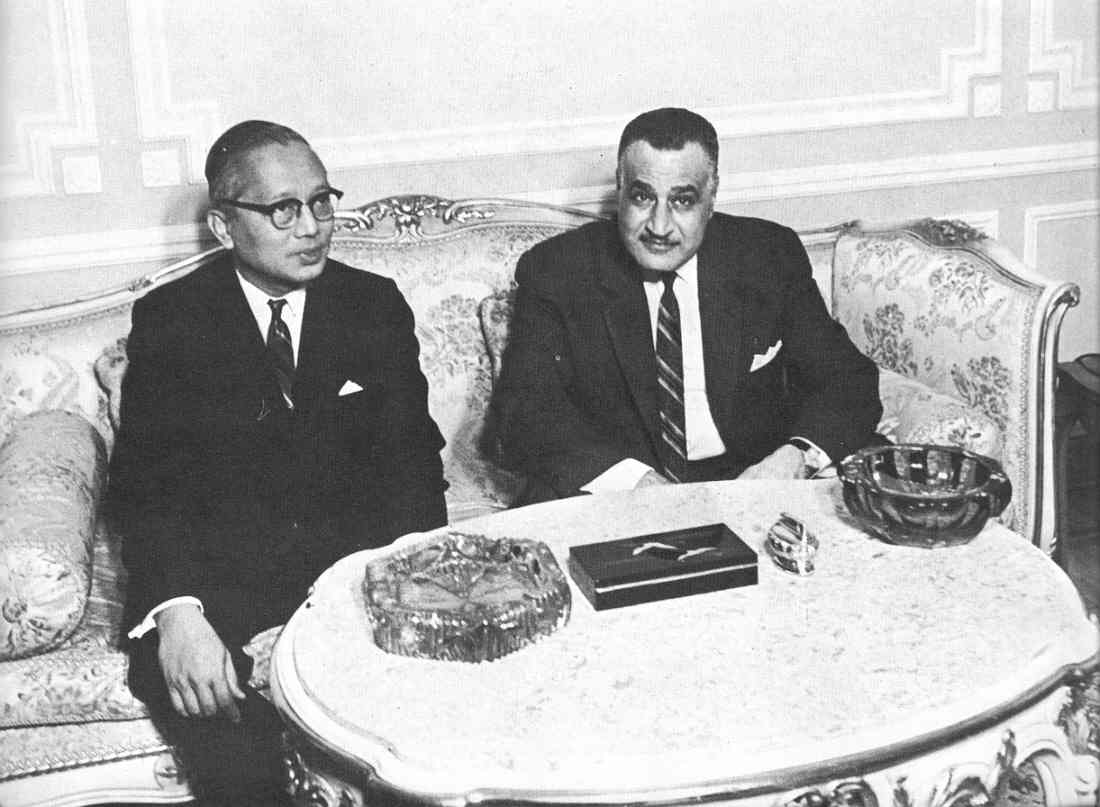
United Nations Secretary
General U Thant meeting with Egyptian President Gamel Abdul Nasser in late May 1967 to try to
back the Egyptians down from a growing confrontation with the
Israelis
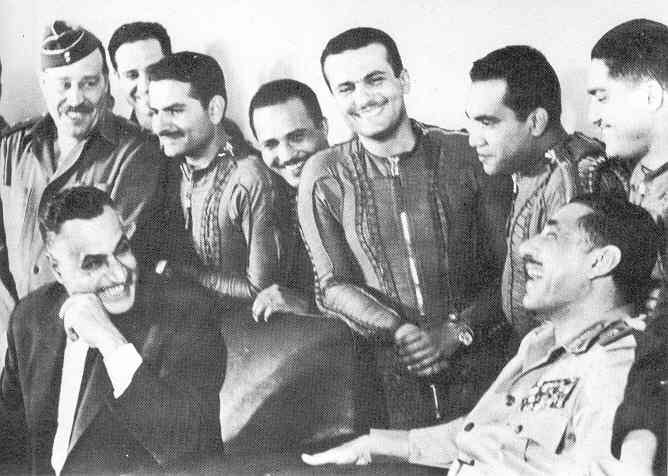
Egyptian President Gamel Abdul Nasser and Egyptian Field Marshall Abdel Hakim Amer enjoying a moment of laughter shortly before the outbreak of the June war with Israel. After the Egyptian defeat, Amer was arrested for plotting to overthrew Nasser and committed suicide.
THE ISRAELIS STRIKE THE FIRST BLOW |
| Then Israel – tired of waiting around to see what Nasser was actually going to do – without any warning, on June the 5th suddenly struck a huge blow to Nasser's military operations. Nasser's air force, caught still positioned on the ground, was quickly destroyed by Israeli jets. This in turn left Nasser's completely surprised ground army without any aircover – as Israeli troops moved rapidly against them. In the matter of only a few days, the Israelis had once again rolled Nasser's troops all the way back to the Suez Canal. |
Without any pror indication of what Israel was planning, it strikes the first blow - 7:45 a.m., June 5, 1967
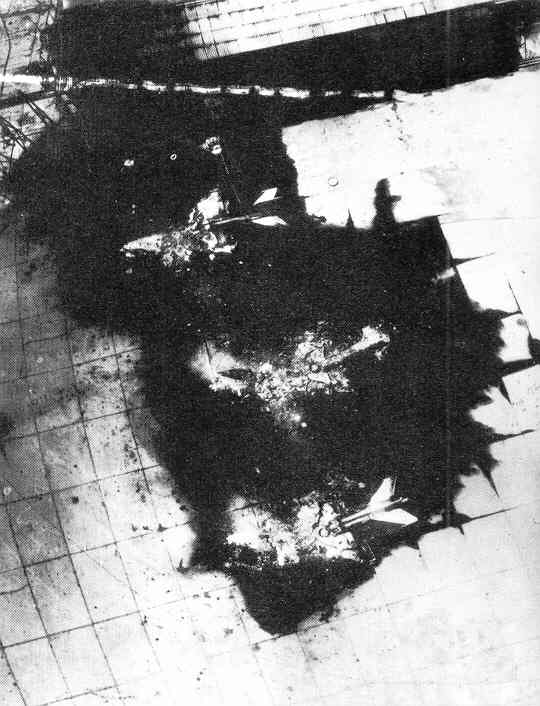
Part of the Egyptian air
force caught unprepared for an Israeli surprise attack - June 1967
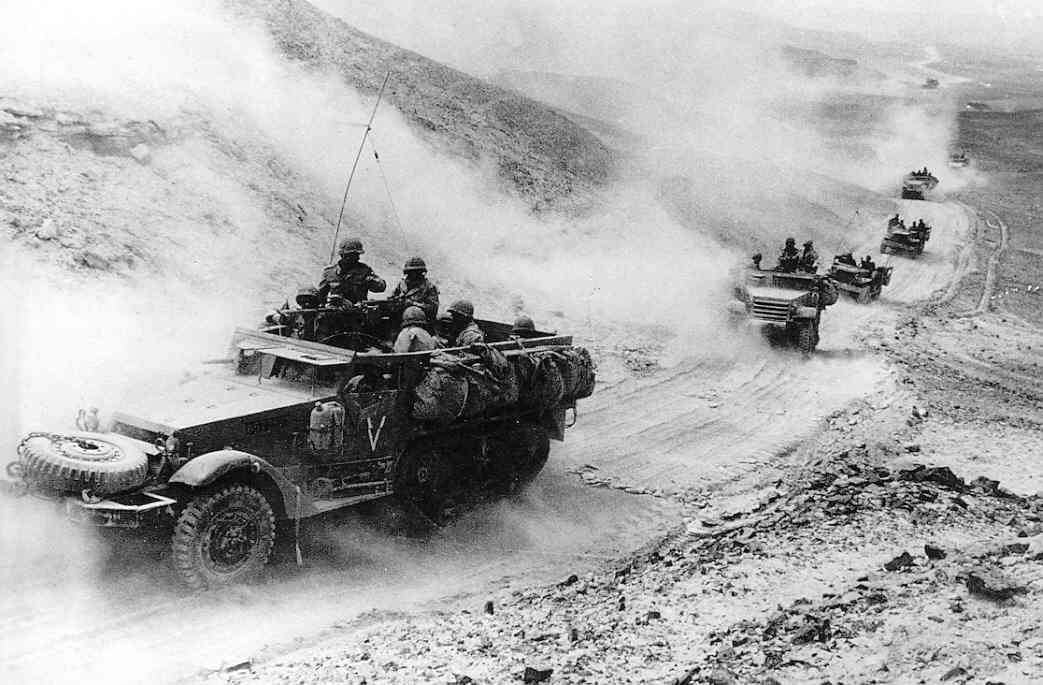
With no danger of air assault by an Egyptian air force, Israeli armored vehicles easily advance
through the Sinai desert - June 1967
Israeli soldiers advancing on Egyptian lines in the Sinai - June 1967
The burned-out remains of
Egyptian armored vehicles and tanks at the Mitla Pass - June 1967
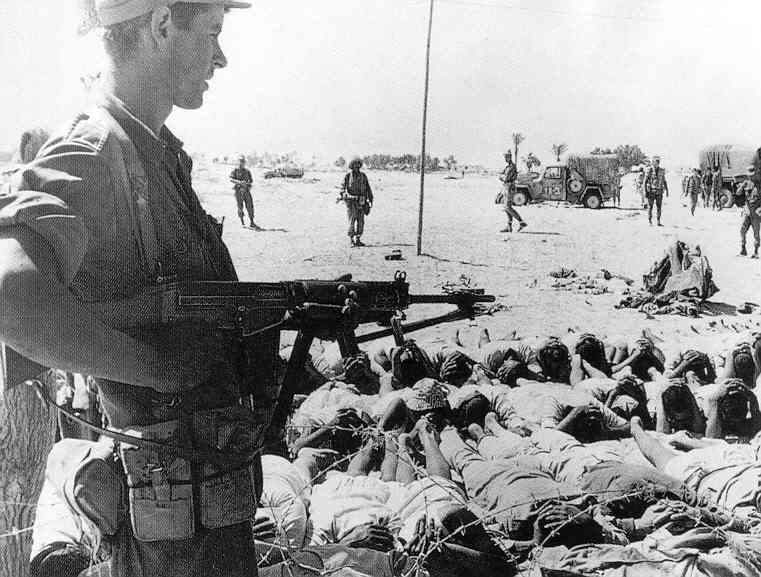
Israeli soldier guarding
Egyptian captives taken in the Gaza strip - June 1967
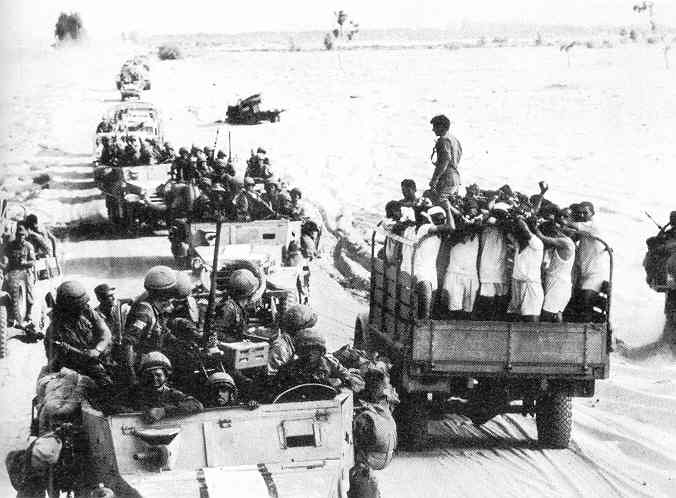
Israeli soliders advancing
toward the front; Egyptian prisoners being brought to the rear
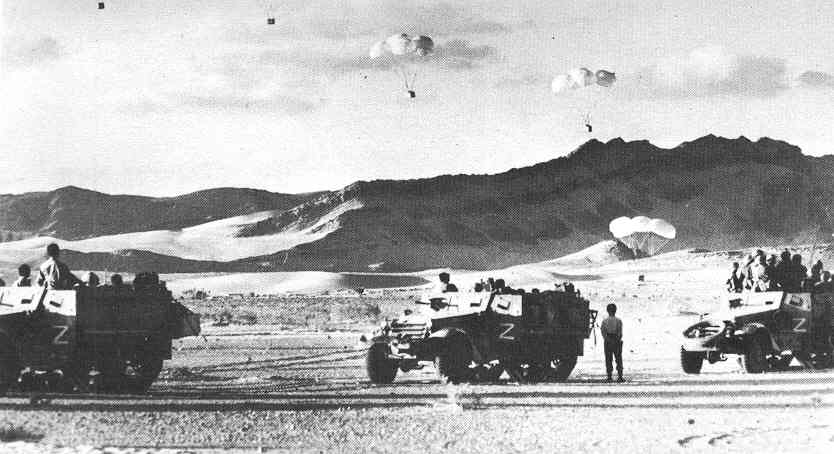
Supplies being dropped to
Israeli troops in the Sinai Desert on the third day of the war - June
1967
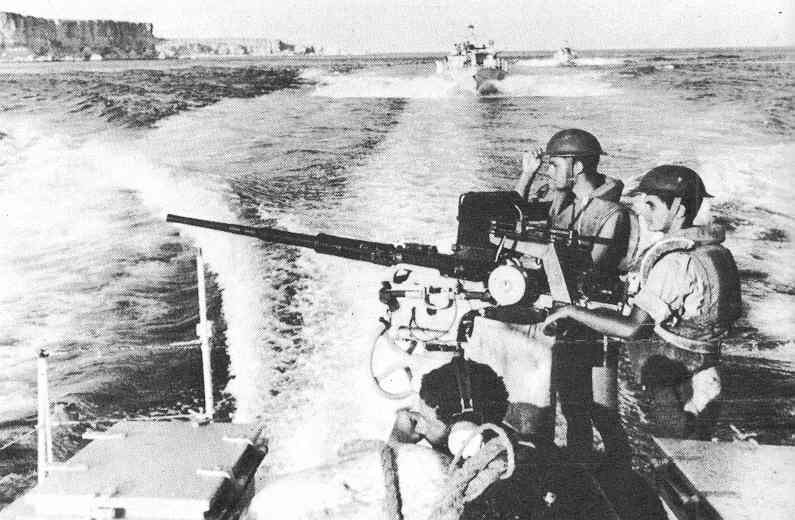
An Israeli torpedo boat patroling
near the captured Sharm el Sheik fortress -- ending the blockade of the
Israeli port of Aqaba
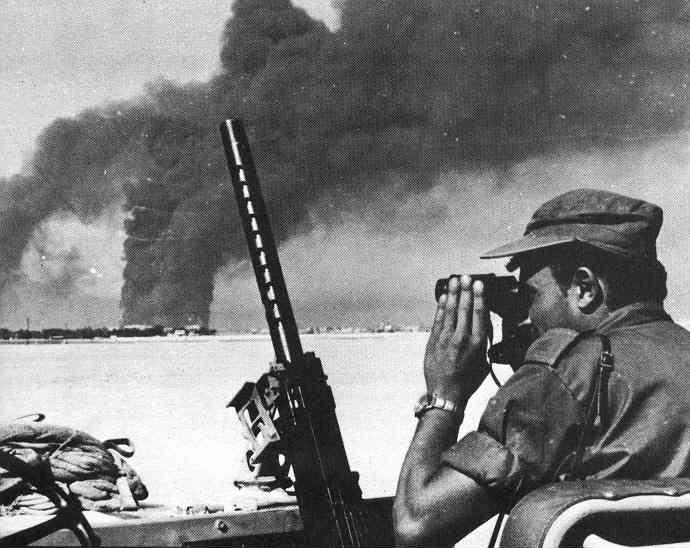
An Israeli soldier observing the burning of an Egyptian oil refinery across the Suez Canal
THE UNITED NATIONS IMMEDIATELY ATTEMPTS TO INTERVENE |
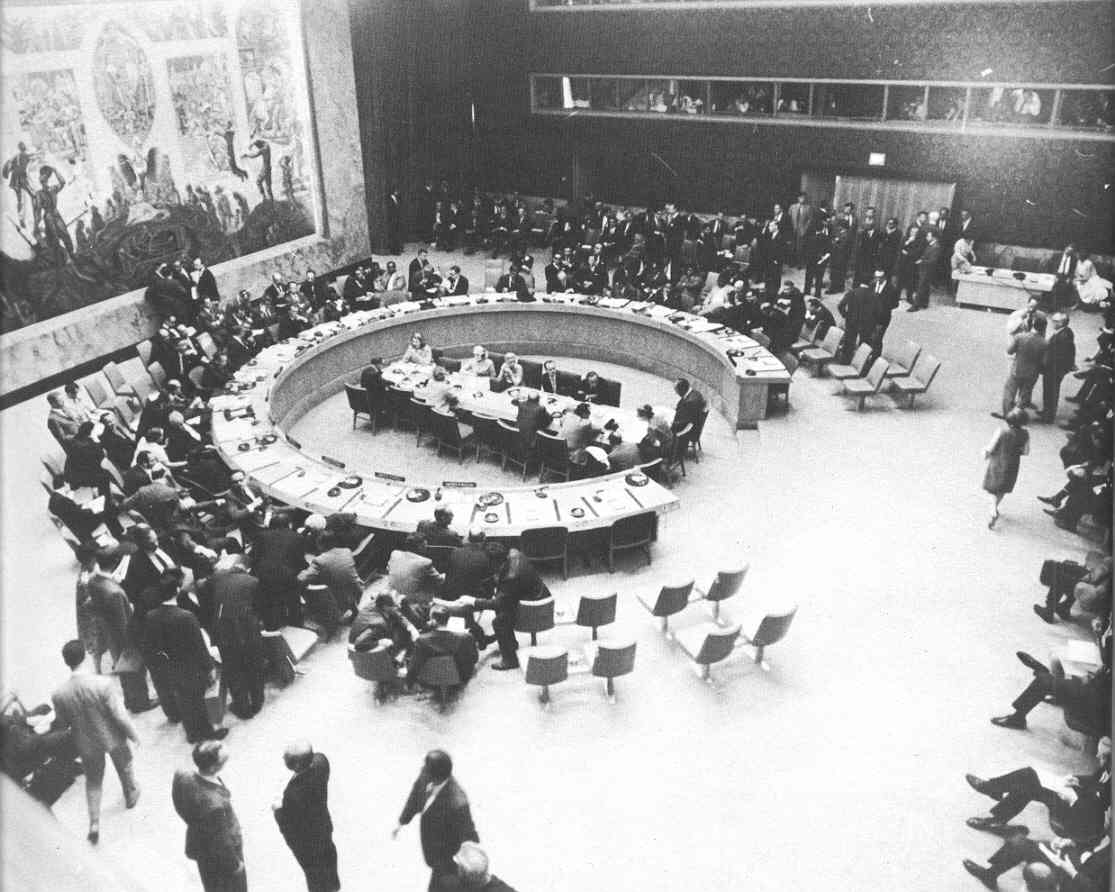
The United Nations Security Council meeting on the Mid-east crisis - June 5, 1967
JORDAN AND SYRIA INTERVENE ... AND LOSE A MASSIVE AMOUNT OF TERRITORY TO THE ISRAELIS |
| Then
most foolishly, Jordanian King Hussein and Syrian President Atassi
decided to come to the aid of Nasser by attacking Israel … only to have
Israel turn its army in their direction … and have the Arabs defeated
on that front as well in only a matter of a few days. The
Jordanian-administered eastern half of Palestine thus came under
Israeli occupation … as well as Syria's strategic Golan Heights. And all of this was achieved in less than a week. |
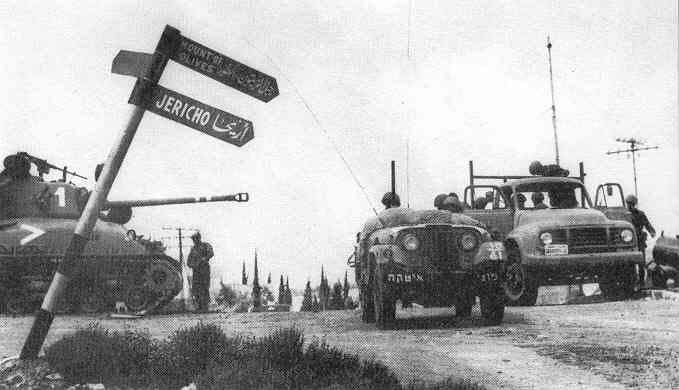
The Israelis sweep quickly
through the West Bank region
against the Jordanians - June 1967
Israeli soldiers planning
their moves into East Jerusalem - June 1967
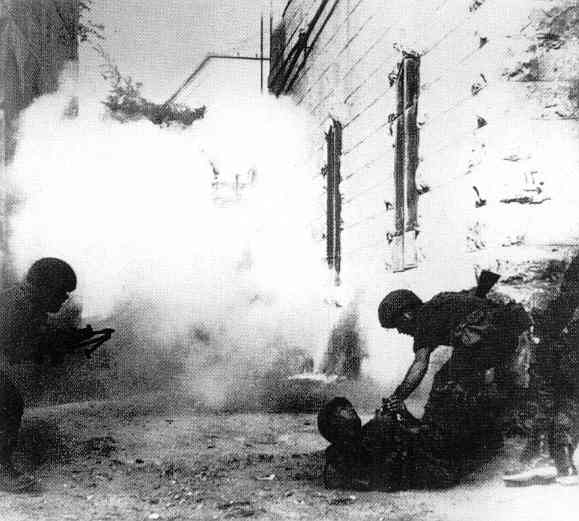
Israeli troops involved in
a street battle for East Jerusalem - June 1967
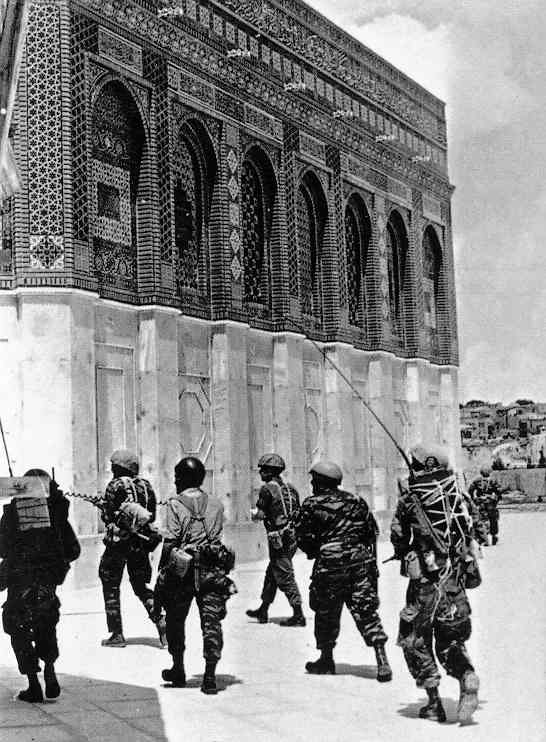
Israeli troops taking control of the
Al Aksa Mosque on the Temple
mount in Jerusalem
AN UNEXPLAINED ISRAELI HIT ON AN AMERICAN SHIP OBSERVING THE EVENT |
| For America, this event was to produce strange developments. The Johnson Administration took an entirely neutral position on the matter … despite the strange Israeli air attack on a clearly marked American research ship Liberty located in international waters north of the Sinai Peninsula … killing 34 and wounding 171 crew members in the process. Ultimately Israel offered no good explanation for the attack … and mostly America just let the issue pass – although Israel eventually offered financial compensation for the "mistake." |
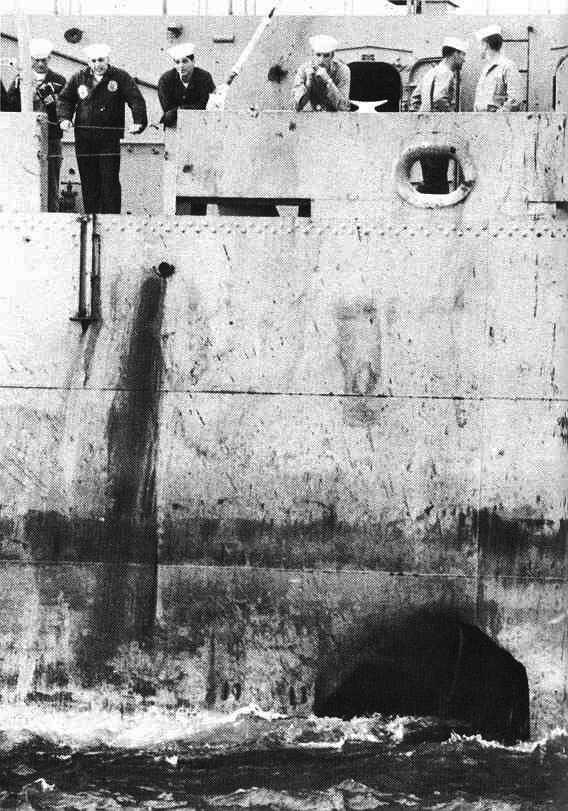
The American monitoring ship USS Liberty holed off the Egyptian coast by an Israeli torpedo – an unexplained Israeli action that caused 100 US casualties (the Israelis never offered a convincing explanation for this attack on a well-marked American naval vessel)
ISRAELI VICTORY ... ARAB DEFEAT |
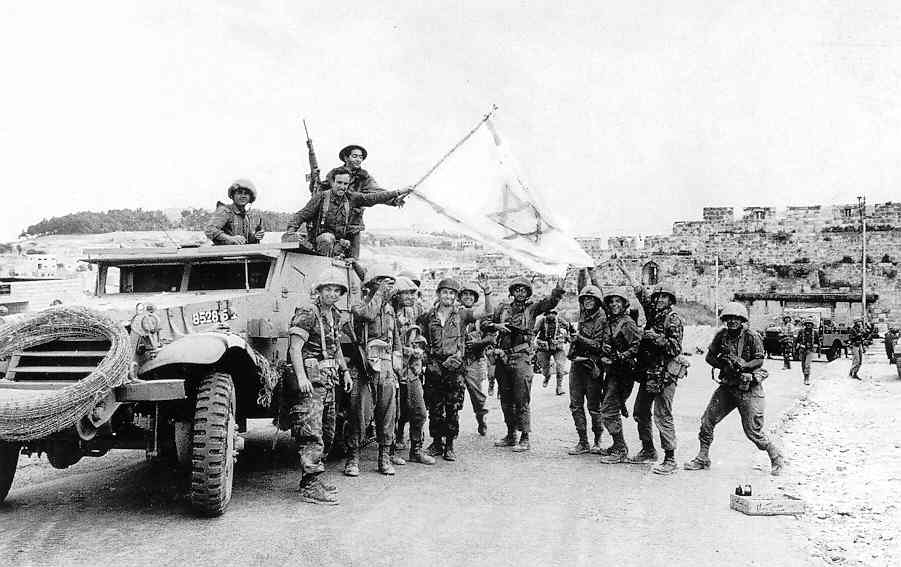
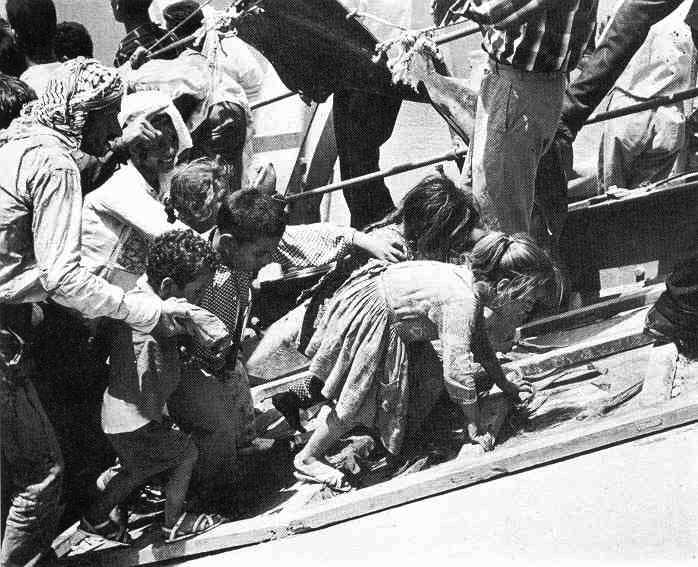
Palestinian refugees (some
of nearly 200,000) fleeing across a demolished Allenby bridge
into Jordan to escape the Israeli occupation
of the West Bank region
United Nations observers at the Suez canal contemplating the consequences for world shipping of the blockage once again of the canal by ships scuttled at both ends (also trapping 15 ships within the canal)
King Hussein of Jordan at the UN calls for withdrawal of Israeli forces from all captured territory
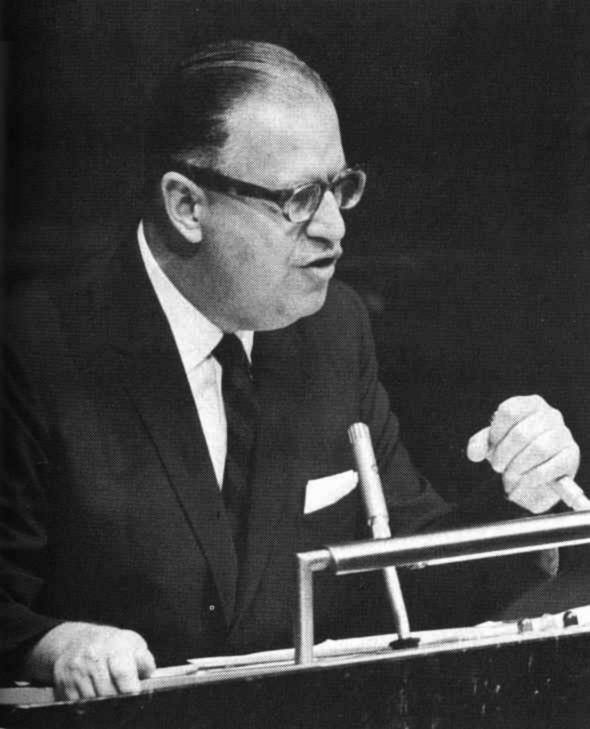
Israeli UN Ambassador Abba
Eban asserts that there will be no withdrawal without face-to-face
negotiations
THE LARGER SOCIAL-POLITICAL RESULTS OF THE ISRAELI VICTORY |
| But
oddest of all was the way Americans now swung themselves in full
support of Israel against the Arab Palestinians … much of this put into
play by the strongly pro-Israeli American media. The Palestinians
were now portrayed as villains … especially their only defense team,
the Palestinian Liberation Organization (PLO). As for the Christian world of Palestine, that went completely (and probably purposely) unnoticed by the American press – and thus also the American citizenry – who actually knew virtually nothing about the ethnic dynamics of this issue. To Americans the matter was now quite simple: the good Israelis were always under attack by the bad Arabs. America should do what it could to always come to Israel's aid. Sadly for Christian Palestinians, they found that under the new circumstances, it was simply easiest to give up their ancient position in Palestine and migrate to the Western world – leaving, for instance, Bethlehem and Nazareth mostly to incoming Muslim settlers … thus dimming greatly the 2,000 year-old gospel light in this very holy land. And American Christians would have no idea whatsoever about the role they themselves played in supporting this development. |
The American nation (though not yet its government) moves solidly into the pro-Israeli camp thanks to a lot of pro-Israeli media slant
Pro-Israeli protesters gather
in front of the White House - June 1967. Behind them is a much smaller
group of pro-Arab protesters

The American media followed
the war almost exclusively from the Israeli perspective ... drawing America broadly
into an on-going pro-Israeli position in the Arab-Israeli dispute
|
The Israeli occupation of the Palestinian West Bank region will now be viewed in Israel as the completion of Israel’s full unification. The world (including the U.S. government) however will not recognize these new boundaries … and the Palestinians will continue to struggle against this expanded Israel in an rather futile effort to secure their own national homeland |
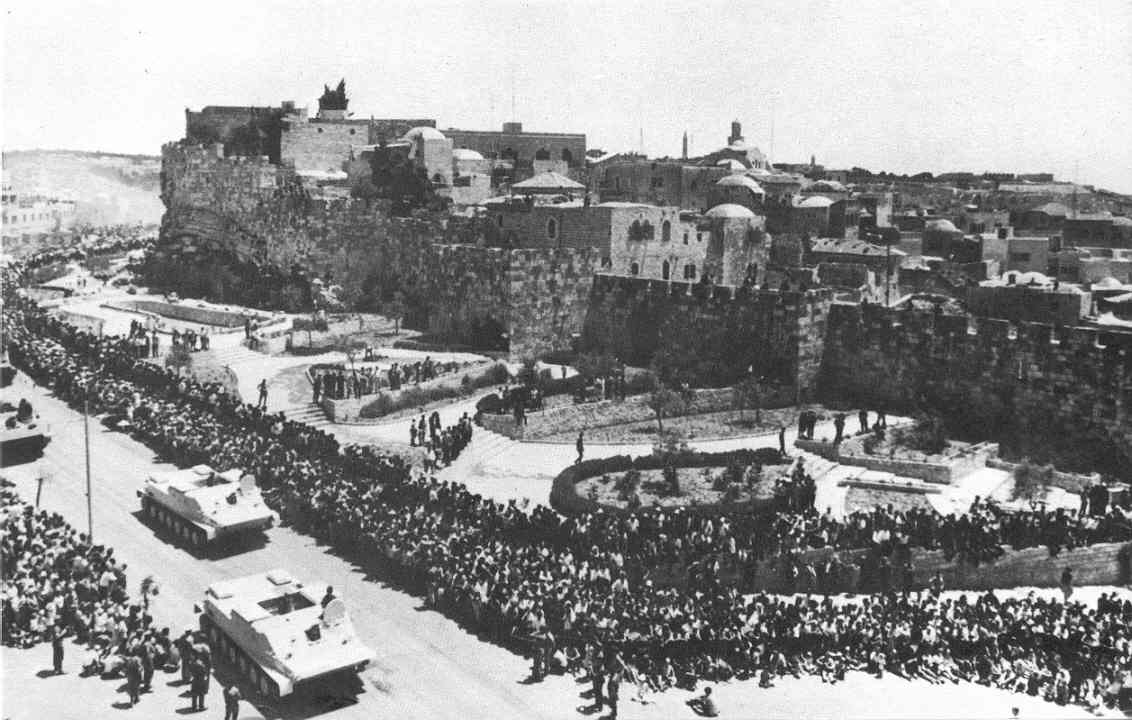
Captured Russian-built Egyptian
tanks being paraded through a "unified" Jerusalem on Israel's 20th Anniversary
- May 2, 1968

He and his organization will be portrayed in the American media and popular culture as a war criminal for his actions in promoting and defending militarily the Palestinian cause

Go on to the next section: The Annus Horribilis: 1968


